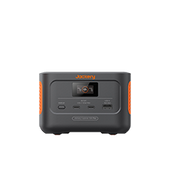The Ultimate Guide to Overlanding Vs. Camping
Imagine spending quality time away from the traffic, amenities, and paved roads. Overlanding and camping are two popular ways to explore nature in the outdoors. While they seem similar, camping and overland trips differ in some major areas, such as level of planning, gear, and choice of destination.

In simple terms, overlanding combines camping and off-roading. But what are the main differences between the two? This comprehensive guide reveals everything about Overlanding camping and the right power gear, like reliable and portable Jackery Solar Generators with higher capacities that let you keep everything powered.
|
Products |
Image |
Capacity |
Rated & Peak Power |
Battery |
Noise Level |
|
Solar Generator 1000 Plus |
 |
1.25-5 kWh |
2000W (4000W Peak) |
LiFePO4 |
Less than 30dB |
|
Solar Generator 1000 Pro |
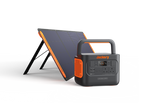 |
1002Wh |
1000W (2000W Peak) |
Lithium-ion |
46dB |
|
Solar Generator 500 |
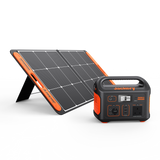 |
518Wh |
500W (1000W Surge) |
Li-ion NMC |
37.9dB |
What Is Overlanding?
Before we dive deep into the article, let's start with the basics — what is overlanding camping? Overlanding means self-reliant, vehicle-based overland (on-road and off-grid) travel to remote destinations.
It acts like a combination of camping, off-roading, and remote travel. Recently, overlanding has gained much popularity among outdoor enthusiasts. The joy of overlanding lies in traveling to unknown trails and exploring nature.
Pros
- Overlanding is a great way to escape the stress of everyday life and promote mental well-being.
- It teaches you self-sufficiency and independence.
- It deepens the appreciation for nature, wildlife, and the environment.
- Engaging in outdoor activities like overlanding improves physical fitness and overall health.
Cons
- You will have to spend money on vehicles, traveling, and gear.
- It requires adequate planning and preparation for the trip.
- You'll have to deal with high maintenance costs caused by potential mechanical breakdowns.
What Is Camping?
Camping is considered a quaint little trip that means enjoying the outdoors with family or friends. The umbrella term "camping" includes van, backpacking, tent, glamping, and survivalist camping. Each term represents different camping techniques separated by purpose, comfort levels, and preferences.
Pros
- You can find peace and tranquility in being outdoors.
- Camping lets you explore places you've never been.
- It enables you to experience a simple lifestyle with minimal amenities for a short time.
- You can practice and learn new survival skills.
Cons
- Living with fewer amenities might be less comfortable for some.
- It can be a lot of fun but involves challenges without the right gear.
Overlanding Vs. Camping: What Are The Differences
Both camping and overlanding are synonymous since they involve habiting outdoors and using fewer amenities. Although they both let you enjoy quality time outdoors, overlanding and camping are two aspects of different spectrums. Let's explain overlanding vs. camping briefly.
Purposes
The core aim of camping is to relax and enjoy a particular location in nature, which can be anything from a trip to a mountaintop plateau to a pristine lakeside nature reserve. Campers already have figured out their trip duration, the area they wish to explore, and even sometimes the activities.
On the other hand, overland camping is a survivalist expenditure journey where the main aim is to enjoy the beauty of off-roads, untouched beauty, and challenging terrains. The joy of the overland camping trip is to make a long drive, set up a tent or camp, and then continue the journey.
Time
Camping is a leisurely activity, and the trips are typically short. On these trips, the campers never leave their home comfort for more than a few days. Instead, these camping trips are well-planned and act as a short break from the usual lifestyle to reconnect with nature.
However, that's not the case with overlanding. In this type of outdoor adventure, you plan to venture into the wilderness or wildlife, often for an unknown period. Overlanders spend weeks, months, and even years exploring different terrains and often different states.
Resources
The resources and facilities differ depending on the camping spot they choose. Luxurious camping sites have access to running water, showers, trash disposal facilities, restrooms, and electricity.
Overlanding means you do not have access to resources and facilities that an average camper enjoys. For instance, there is no bathroom facility on the overlanding trips, so you'll have to make the most out of your gear.
Planning Process
When planning a camping trip, you have to prepare for the camping trip, the activities you'll indulge in, and the gear that will help you create a successful camping trip.
Overlanding is a complicated and intricate process with a lot of unknown variables. The best way to plan for overlanding camping is by understanding the weather and terrain you will be in.
Gear
Whether you are planning for an overlanding trip or camping, you'll need to carry some basic gear. Let's explain essential overlanding camping gear briefly.
- Tents:When overlanding, you'll typically be staying in your recreational vehicle. But if you are living in a tent, consider ground tents or rooftop tents. Depending on the trip, you may choose a standard tent or rooftop.
- Water Tank:On your outdoor trip, you'll need enough water for cooking, hygiene, and drinking. Generally, one gallon of water per person per day is sufficient. In addition to water, carry a portable water filter to clean sediment and contaminants.
- First Aid: At the minimum, take a basic first aid kit with necessary medicines for cuts and scrapes.
- Power Source: In order to keep your electrical devices charged, you'll need some sort of power setup. A solar system is often a preferred route that requires solar panels and a power station. You can use a portable option that requires no installation, like Jackery Solar Generator. If you are going for a few days, Jackery Solar Generator 1000 Plus seems like a wise choice.
Jackery Solar Generators for Overlanding & Camping
Finding the best solar generator for overland camping will depend on your power needs. For example, if you are charging a smartphone (20W), lamp (150W), RV refrigerator (180W), and coffee maker (600W), you could use a small solar generator that can supply 1000 watts per hour.
Jackery Solar Generators combine Explorer Portable Power Stations and SolarSaga Solar Panels to generate electricity using free sunlight. These power solutions can charge most of your outdoor appliances for long hours, especially when you're away from the electrical outlets.
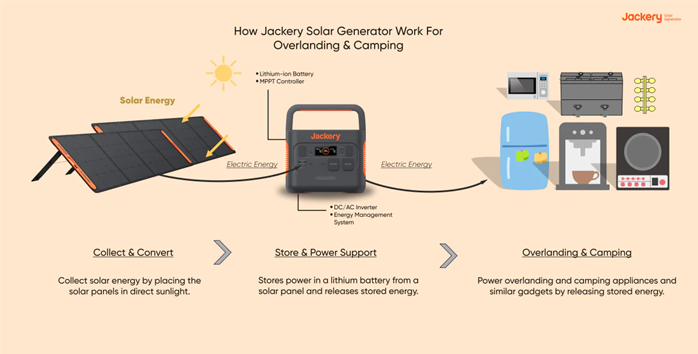
Here are the best battery backups for outdoor use.
Jackery Solar Generator 1000 Plus
Jackery Solar Generator 1000 Plus features a battery capacity of 1264Wh and 2000W maximum output. The LiFePO4 battery supports 99% of your appliances like car fridges, coffee makers, electric cookers, portable ACs, and more. With 4*Jackery SolarSaga 100W Solar Panels, you can charge the Explorer 1000 Plus Portable Power Station in only 4.5 hours.

Jackery Solar Generator 1000 Pro
Jackery Solar Generator 1000 Pro is a lightweight and compact charging solution with a battery capacity of 1002Wh. The super quiet solar generator can be fully charged within 1.8 hours using 4*SolarSaga 200W Solar Panels. It has various output ports to charge multiple appliances simultaneously.

Customer Review
"I love this thing! My Jackery 1000 Pro has proven helpful in many areas of my daily life. From camping (powering all my appliances and even my microwave), fishing, charging batteries, and my power tools, it even acts as my UPS for my computer." — Christopher J.
Jackery Solar Generator 500
With a battery capacity of 518Wh, the Jackery Solar Generator 500 is one of the portable and lightweight charging solutions for overland camping. It features seven output ports to charge seven electrical devices simultaneously. The Explorer 500 Portable Power Station is the same size as a basketball, making it suitable for camping, RVs, and road trips.
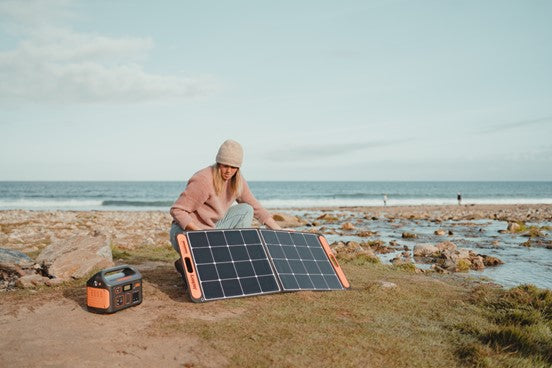
Customer Review
"Jackery has put together a great little system to keep small appliances, phones, and laptops powered up during times when you have no access to electricity. This makes it great for camping or when storms take out the power lines." — L Williams.
|
Series |
Capacity |
Battery |
Output Ports |
Overland Camping |
|
Solar Generator 1000 Plus |
1.25-5 kWh
|
LiFePO4 |
AC Output (x3): 120V~60Hz, 2000W (4000W Peak) USB-A Output (x2): 18W Max, 5-5V⎓3A USB-C Output (x2): 100W Max, (5V, 9V, 12V, 15V, 20V up to 5A) |
Microwave (1000W): 1H Blender (300W): 3.5H Space Heater (300W): 3.5H Coffee Maker (550W): 1.9H Toaster (650W): 1.6H Kettle (850W): 1.2H Phone (18W): 60H |
|
Solar Generator 1000 Pro |
1002Wh |
Lithium-ion
|
AC Output (x3): 120V, 60Hz, 1000W (2000W Peak) USB-A Output (x2): Quick Charge 3.0x2, 18W Max USB-C Output (x2): 100W Max, (5V, 9V, 12V, 15V, 20V up to 5A) |
Blender (300W): 2.8H Space Heater (300W): 2.8H Coffee Maker (550W): 1.5H Toaster (650W): 1.3H Kettle (850W): 1H Phone (18W): 47.3H |
|
Solar Generator 500 |
518Wh |
Li-ion NMC
|
AC Output (x1): 110VAC, 60Hz, 500W (1000W Surge) DC Output (x2): 12V, 7A USB-A Output (x3): 5V, 2.4A |
Blender (300W): 1.4H Space Heater (300W): 1.4H Phone (18W): 24.4H |
How to Find the Best Places for Overland Camping?
The main concern of overlanders is to find the best place where they can enjoy. Here are some different places where you can discover overlanding campsites.
Public Lands & Campgrounds: Often managed by federal agencies, these are popular places where you can camp. These lands include the Bureau of Land Management (BLU), national forests, national parks and monuments, and State Lands.
Private Lands & Campgrounds: Also known as commercial camping sites, they offer amenities like electricity, toilets, running water, and showers. Some also have picnic tables, fire pits, and other facilities to take your camping experience to the next level.
Here are some tips for choosing the best site for overland camping.
- Consider the size of your party and vehicle to ensure the site can accommodate everything.
- Check if the overlanding site provides access to potable water, electricity, etc.
- Always have necessary permits or reservations for the campsite (if applicable).
- Follow leave-no-trace principles to preserve the natural beauty of the area.
Overlanding Camping FAQs
What size of solar generator do I need for overland camping?
Portable solar power generators are lightweight and easy to set up, making them great outdoor gear. Jackery Solar Generators are designed to help you power essential appliances carried during the overlanding trip. If you are using Jackery Solar Generator 1000 Pro with a battery capacity of 1002Wh to charge 500 watts consuming devices, the working time will be:
Working Time = Capacity in Wh × 0.85 / Operating wattage of the devices = 1002Wh × 0.85 / 500W = 1.7H.
What to consider when choosing overland camping?
When planning overland camping, you'll need to get the basics right by preparing your mind, setting up, and starting small. Remember, overlanding camping is like a mental game that requires patience and planning. You must prepare your overlanding setup to depend on during the adventure travel or when going to remote areas.
What is the best state for overlanding?
The best state for overlanding depends on where you live and what you want. For example, Colorado is home to nearly 8.3 million acres of BLM land, while Oregon and California offer longer routes.
Final Thoughts
Overlanding and camping might seem very similar, but there are some differences in the purpose of the trip, the gear required, and the planning process. While camping focuses more on the destination, overlanding is meant to enjoy the journey.
If you are planning for an overlanding camping trip, make sure you have all the essential gear ready. Jackery Solar Generators are great outdoor powering solutions for charging appliances like electric stoves, coffee makers, portable air conditioners, and more.











